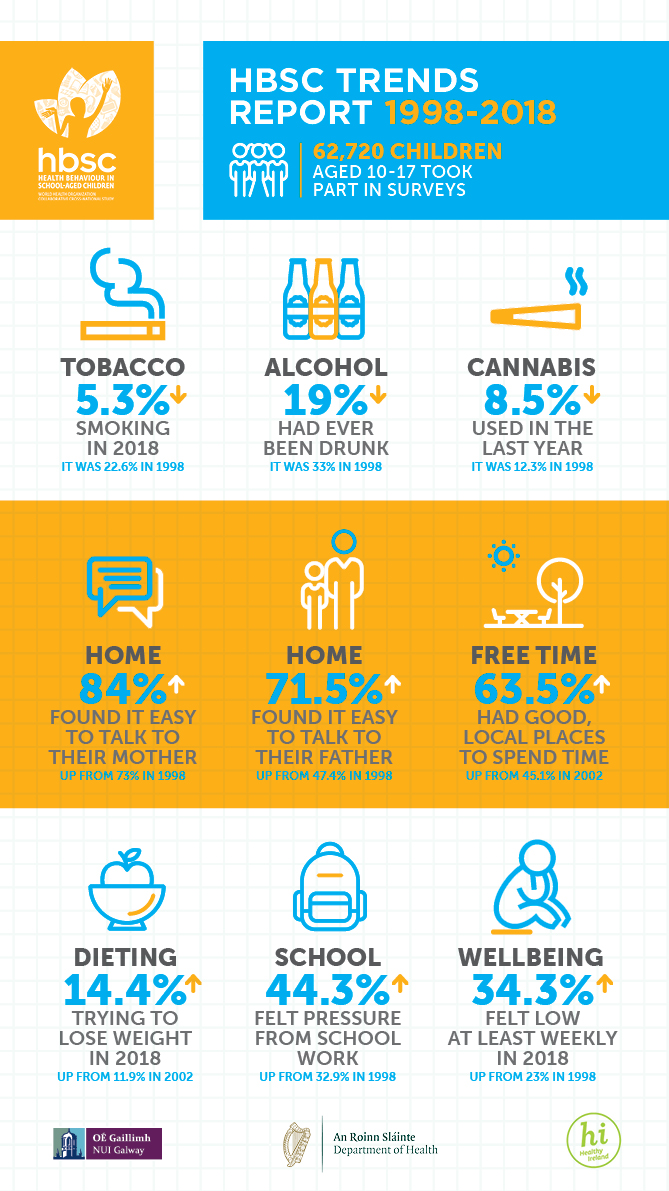-
Courses

Courses
Choosing a course is one of the most important decisions you'll ever make! View our courses and see what our students and lecturers have to say about the courses you are interested in at the links below.
-
University Life

University Life
Each year more than 4,000 choose University of Galway as their University of choice. Find out what life at University of Galway is all about here.
-
About University of Galway

About University of Galway
Since 1845, University of Galway has been sharing the highest quality teaching and research with Ireland and the world. Find out what makes our University so special – from our distinguished history to the latest news and campus developments.
-
Colleges & Schools

Colleges & Schools
University of Galway has earned international recognition as a research-led university with a commitment to top quality teaching across a range of key areas of expertise.
-
Research & Innovation

Research & Innovation
University of Galway’s vibrant research community take on some of the most pressing challenges of our times.
-
Business & Industry

Guiding Breakthrough Research at University of Galway
We explore and facilitate commercial opportunities for the research community at University of Galway, as well as facilitating industry partnership.
-
Alumni & Friends

Alumni & Friends
There are 128,000 University of Galway alumni worldwide. Stay connected to your alumni community! Join our social networks and update your details online.
-
Community Engagement

Community Engagement
At University of Galway, we believe that the best learning takes place when you apply what you learn in a real world context. That's why many of our courses include work placements or community projects.
2018 study
 HEALTH BEHAVIOUR IN SCHOOL-AGED CHILDREN (HBSC) IRELAND
HEALTH BEHAVIOUR IN SCHOOL-AGED CHILDREN (HBSC) IRELAND
World Health Organization Collaborative Cross-National Study
The Health Behaviour in School-aged Children (HBSC) survey is a WHO collaborative cross-national study that monitors the health behaviours, health outcomes and social environments of school-aged children every four years. HBSC Ireland surveys school-going children aged 9-18 years. The study is conducted by the HBSC Ireland team, based at the Health Promotion Research Centre, University of Galway.
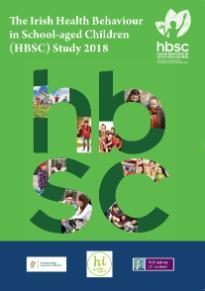
The 2018 HBSC Ireland Report was launched by Minister for Health Simon Harris TD and Minister for Health Promotion Catherine Byrne TD, on Thursday 9 January 2020.
Download the full report here:
Költő, A., Gavin, A., Molcho, M., Kelly, C., Walker, L., & Nic Gabhainn, S. (2020). The Irish Health Behaviour in School-aged Children (HBSC) Study 2018. Dublin: Department of Health & Galway: Health Promotion Research Centre, National University of Ireland, Galway. download (5,699KB)
A total of 255 primary and post primary schools took part with 15,557 children completing questionnaires.
We would like to extend a big thank you to all of the children, their schools and parents for taking part in the 2018 HBSC study. Without your participation and time the study would not have been such a success.
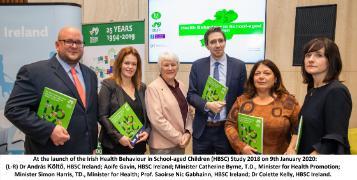
A copy of the launch presentation by András Költő is also available to download (2001KB)
Download the press release download (392KB)
Check our twitter page: @hbscireland
Infographics
(download to view full size)
|
|
 Fighting and Bullying download |
 Food and dietary behaviour download |
 Mental health download |
 Sexual health behaviours download |
 Substance use download |
KEY FINDINGS
DISSEMINATION
Findings from HBSC Ireland 2018 will be distributed in reports, journal articles, factsheets and presentations to various interest groups. A full list of publications and articles etc. can be found on the publications page.
HBSC Ireland Publications and Media Coverage 2020 download
2018 Full Variable Report
This report includes all variables included in the 2018 study, and provides details for every response option by age, gender, and social class and their interactions. The outputs are presented by section below:
About school download
About you download
About you and your friends download
Bullying and cyberbullying download
Eating and dieting download
Electronic communication download
Family characteristics and relationships download
Mental health and wellbeing, discrimination and puberty download
Physical Activity download
Romantic relationships and sexual behaviour download
Sun Protection download
Tobacco, alcohol and drugs download
Violcence and injuries download
Your local area download
download a printable copy of this Infographic of findings from the latest HBSC Trends report
Trends in Health Behaviours, Health Outcomes and Contextual Factors between 1998-2018.
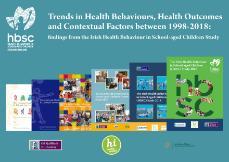 The HBSC Ireland report Trends in Health Behaviours, Health Outcomes and Contextual Factors between 1998-2018: findings from the Irish Health Behaviour in School-aged Children Study was launched on 8th March 2021 by Frank Feighan, Minister of State with responsibility for Public Health, Wellbeing and National Drugs Strategy.
The HBSC Ireland report Trends in Health Behaviours, Health Outcomes and Contextual Factors between 1998-2018: findings from the Irish Health Behaviour in School-aged Children Study was launched on 8th March 2021 by Frank Feighan, Minister of State with responsibility for Public Health, Wellbeing and National Drugs Strategy.
The report explores the trends in the health and wellbeing of children in Ireland between 1998 and 2018. To date, HBSC Ireland has collected data from 62,720 school-aged children aged 10-17 years across the Republic of Ireland. The report describes the self-reported health status of children in Ireland over time in relation to key indicators: health behaviours, health outcomes and the contexts of their lives. Internationally comparable trends data are also included.
Download the report:
Gavin, A., Költő, A., Kelly, C., Molcho, M., & Nic Gabhainn, S. (2021). Trends in Health Behaviours, Health Outcomes and Contextual Factors between 1998-2018: findings from the Irish Health Behaviour in School-aged Children Study. Dublin: Department of Health download
Download a copy of the press release: English version download, Irish version download
See the HBSC International website http://www.hbsc.org/ for more HBSC International publications.
2017/18 HBSC INTERNATIONAL REPORT - LAUNCHED 19 May 2020
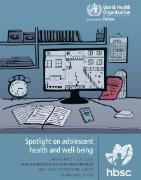 The HBSC international report from the 2017/2018 survey is now available. The Spotlight on Adolescent Health and Well-being provides data from 45 countries in Europe and Canada. Findings are presented on the health and social behaviours of almost 228,000 young people aged 11, 13 and 15 years.
The HBSC international report from the 2017/2018 survey is now available. The Spotlight on Adolescent Health and Well-being provides data from 45 countries in Europe and Canada. Findings are presented on the health and social behaviours of almost 228,000 young people aged 11, 13 and 15 years.
The cross-national survey covers diverse aspects of adolescent health and social behaviour, including self-assessment of mental health; body image; dietary habits; physical activity; school context; relationships with families and peers; tobacco, alcohol and cannabis use; bullying and injuries; and sexual health (for those aged 15 and above only). A special focus on online communication was included in the most recent HBSC survey, to better understand the expanding role of digital technology in young people’s lives.
The study highlights the changing status of mental well-being among the Region’s youth. Reports of poor mental health – feeling low, nervous or irritable – are increasing across the Region. The data also clearly show that mental health declines with age. While technology can have positive benefits, it can also introduce new threats, such as cyberbullying, which disproportionately affects girls. Over 1 in 10 adolescents report having been cyberbullied at least once in the past two months.
As the latest HBSC study, featuring findings from 2017/2018, is released, the world is grappling with the COVID-19 pandemic. The next study, which will feature findings from 2021/2022, will therefore reflect the impact of the pandemic on the lives of young people.
Further information can be found on the WHO/Europe website
To access both Volume 1 Key Findings and Volume 2 Key Data of Spotlight on Adolescent Health and Well-Being, visit: https://hbsc.org/publications/reports/spotlight-on-adolescent-health-and-well-being/
HBSC special issue published in Journal of Adolescent Health
12 May 2020
 We are delighted to announce that a special issue of the Journal of Adolescent Health has been published to accompany the launch of the International HBSC report. This includes ten scientific journal articles and three commentaries, which are the first international publications from the 2018 datasets. You can find the special issue at https://www.jahonline.org/issue/S1054-139X(20)X0013-9.
We are delighted to announce that a special issue of the Journal of Adolescent Health has been published to accompany the launch of the International HBSC report. This includes ten scientific journal articles and three commentaries, which are the first international publications from the 2018 datasets. You can find the special issue at https://www.jahonline.org/issue/S1054-139X(20)X0013-9.
In addition to the national and international reports HBSC Ireland 2018 data has been used in the following government and other health organisations reports:
UNICEF - Worlds of Influence: Understanding what shapes child well-being in rich countries
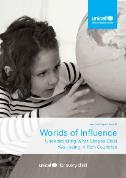
HBSC Ireland data features in a new UNICEF report Worlds of Influence: Understanding child well-being in rich countries. This report reveals children’s experiences against the backdrop of their country’s policies and social, educational, economic and environmental contexts.
State of the Nation's Children: Ireland 2020
22 December 2020
Published by the Department of Children, Equality, Disability, Integration and Youth the State of the Nation's Children report is now available as a web version. HBSC Ireland is a main data source for this report which provides the most up-to-date data on the National Set of Child Wellbeing indicators, and:
- charts the wellbeing of children in Ireland
- tracks changes over time
- benchmarks progress in Ireland relative to other countries
- highlights policy issues arising
New report on young carer's in Ireland
1 December 2020
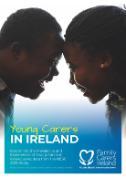
Family Carers Ireland have published an new report briefing which sets out key findings relating to young carers' health and wellbeing, social enviroments and health behaviours. The report draws on findings from the HSBC Ireland 2018 study,
Download the full report: Young Carers in Ireland: Insight into the Prevalence and Experiences of Young Carers in Ireland using data from the HBSC 2018 Study.
New report presents first data on sunburn, sun protection behaviours and sunbed use in under-18’s
17 June 2020
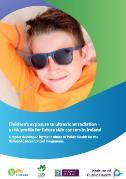
The report, Children’s exposure to ultraviolet radiation – risk profile for future skin cancers in Ireland, presents data on risk factors in Ireland for developing skin cancer in adult life
This report was developed to inform implementation of the National Skin Cancer Prevention Plan 2019-2022.
Data is presented principally from the 2018 Health Behaviours in School-Aged Children (HBSC) Survey, which reports health behaviours for those aged 10 to 17-years-old. The total sample size was 10,271.
Childhood sunburn, unprotected sun exposure and use of sunbeds increase the risk of developing skin cancers later in life. Repeated episodes of severe sunburn during childhood doubles the risk of developing melanoma – the most serious form of skin cancer – in later life.
Some of the key findings of the report include:
- Nearly 90% of 10 to 17-year olds said they have experienced sunburn in their lifetime. Around 74% said they experienced sunburn at least once during the past year.
- Eight out of 10 schoolchildren reported wearing sunscreen, while seven out of 10 reported using sunglasses on sunny days.
- The adoption of other sun protection measures, like covering up, wearing hats and avoiding peak UV hours, were less consistent.
- 32% of schoolchildren reported that they avoided peak UV hours of the day.
- Around 50% said they wore protective clothing to cover arms and legs when in the sun, while 17% reported never using sunscreen.
- Girls were more likely to wear sunscreen, sunglasses, clothes that cover arms and legs as well as avoid peak UV hours. Boys were more likely to wear hats.
- 3% of children said they used a sunbed in the last 12 months. The provision of sunbed services to children aged under 18 is contrary to Irish law as outlined in the Public Health (Sunbeds) Act 2014.
- Six of the 10 warmest years in Ireland’s history have occurred during the childhoods of the current cohort of 18 to 20-year olds.
- Climate research predicts hotter summers and more heatwaves. This may present elevating risk for UV skin damage, particularly in terms of childhood exposures during the summer school holidays.
See https://publichealth.ie/uvreport/ for more information, including a link to a recording of the launch webinar.
Department of Children and Youth Affairs: Young Travellers in Ireland
14 April 2020
Minister for Children and Youth Affairs, Dr Katherine Zappone, published thei Statstical Spotlight #4 Young Travellers in Ireland report by the Department of Children and Youth Affairs. HBSC Ireland data fetures in the report which focuses on children and young persons who are members of the Traveller community, on topics such as health, housing, education and economic status. The Spotlight also contains a small amount of information on young Roma.
It contains data on a number of areas including:
- the number of Young Travellers and the locations where they live
- fertility rate and number of births
- health status, disability status
- education levels of mothers
- pre-school and education from early years through to third level
- accommodation type and numbers in emergency accommodation
- labour force status
- Travellers as carers









